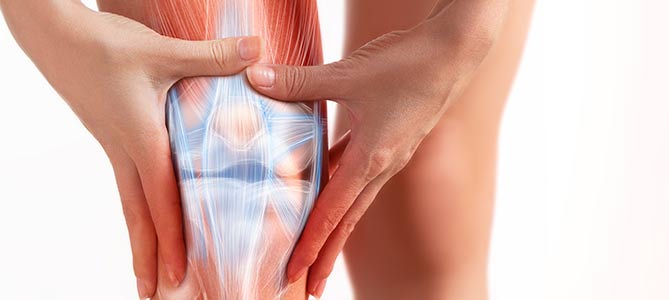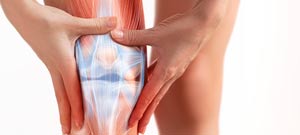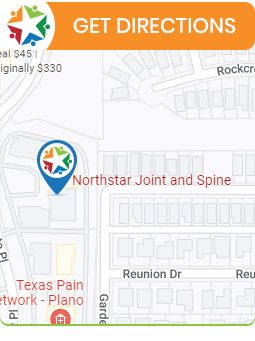Joint Injections Specialist in Plano, TX
Osteoarthritis and tendinopathy in the knee, hip, shoulder, elbow, or other joints can limit mobility and affect the quality of life. Joint injections can provide a significant amount of relief, but results vary from one patient to the next. At Northstar Joint and Spine, Triple Board Certified Dr. Robert J. Nocerini is experienced in providing joint injections and can help you find relief from your painful condition. Contact us today for more information or schedule an appointment online. We are conveniently located at 7704 San Jacinto Pl Suite #200 Plano, TX 75024.




Table of Contents:
What are joint injections?
What conditions may benefit from joint injections?
What can I expect from joint injections?
What are the benefits of joint injections?
Why do doctors recommend joint injections?
Joint Injections with Dr. Nocerini in Plano, TX: Targeted Relief for Joint Pain
Osteoarthritis and tendinopathy in the knee, hip, shoulder, elbow, or other joints can limit mobility and affect the quality of life. Treatment of pain in these joints can be accomplished with different types of joint injections. Traditionally, pain due to osteoarthritis or other joint problems might be treated with steroids, but in recent years a number of new therapies have been introduced that can effectively treat these conditions. There are different types of joint injections that can target a wide array of different conditions, including pain, inflammation, and swelling.
Joint injections administer medications or other naturally occurring substances to the joints to treat pain due to arthritis, tendinopathy, bursitis, and other conditions. Joint injections are injected into the joints of the body, either into the synovial fluid of the joint or targeting the surrounding components of the joint, such as the ligaments, tendons, or bursae.
To maximize accuracy and effectiveness and to ensure that the needle is injected at its designated location, the doctor may use X-ray guidance (fluoroscopy) or ultrasound.
Shoulder Pain:
Determining the cause of shoulder pain requires a careful history and physical examination. Pain with different movements, such as lifting overhead, reaching behind the back, or pain with sleeping on a painful shoulder may give information regarding the source of pain. Shoulder pain can be due to many potential causes, such as:
• Glenohumeral Joint Osteoarthritis
• Acromioclavicular (AC) Arthritis
• Rotator Cuff Tendinopathy
• Tendinosis
• Biceps Tendinitis
• Labral Tears
• Frozen Shoulder
• Subacromial Bursitis
These conditions may respond to shoulder injections that target the specific location of the problem.
Knee Pain:
Knee pain can be due to multiple causes and conditions. Specific knee conditions that can cause pain are:
• Arthritis
• Ligament Sprain (lateral collateral, medial collateral, ACL, PCL)
• Tendon Strain
• Patellar Tendinopathy
• Patellar Tendinosis
• Patellar Tendinitis (Jumper’s Knee)
• Meniscus Tears
• Chondromalacia Patella
• Patellofemoral Syndrome (Runner’s Knee)
• Bursitis
• Iliotibial Band Syndrome (also called IT Band Syndrome)
There are multiple treatment options available for these conditions that may include medications, injections, or physical therapy.
Elbow Pain:
A common cause of elbow pain is Lateral Epicondylitis, also known as Tennis Elbow. While the condition can be seen in individuals who play tennis, most people with tennis elbow have never played tennis. Pain due to Tennis Elbow is felt on the outside, or lateral, aspect of the elbow. The pain can either be from inflammation or degeneration of the tendon on the outside of the elbow that is used to extend the wrist. This tendon is called the Extensor Carpi Radialis Brevis (ECRB).
Medial Epicondylitis, also known as Golfer’s Elbow, is experienced on the inside, or medial aspect of the elbow joint. Both Medial and Lateral Epicondylitis can respond well to a combination of injections and rehabilitative exercises.
Hip Pain:
A careful physical examination along with questions to determine specifically where the pain is felt can help make the diagnosis of the cause of the hip pain. Sometimes imaging with X-rays or an MRI is necessary to determine the cause of pain.
Hip pain can have multiple potential causes and conditions. Specific hip conditions that can cause pain are:
• Osteoarthritis
• Femoral Acetabular Syndrome
• Labral Tears
• Piriformis Syndrome
• Trochanteric Bursitis
• Gluteal Tendinopathy
• Tendinosis
Joint injections can provide a significant amount of relief, but results vary from one patient to the next. Patients may experience relief from pain that can last several months. Most joint injections are quick in-office procedures that usually take around 10 minutes to perform. There may be a brief period of recovery following a joint injection, including mild pain and swelling; this should clear up within a few hours but may last longer in certain situations. To maximize accuracy and effectiveness and to ensure that the needle is in the appropriate position, the doctor may use X-ray guidance (fluoroscopy) or ultrasound. In many cases, a local anesthetic provides immediate relief; this effect is temporary and will wear off after the anesthetic has been metabolized by the body. If steroids are used, inflammation may decrease, and the full results of the treatment should be achieved within a few days.
The benefits of joint injections include:
• Rapid Pain Relief — Many patients experience immediate pain relief as the therapeutic medication goes directly to the problem area in the joint.
• Long-Lasting Results — Although some people notice near-immediate improvements to their pain, joint injections usually start working within 24-48 hours and often last for several weeks, sometimes longer. This makes joint injections highly beneficial for people who want fast relief from an arthritic flare-up.
• Alleviation of Swelling and Stiffness — Swelling and stiffness in the joints can impede range of motion and physical function; alleviating these symptoms can lead to better mobility and also lower the risk of additional pain.
• Low Risk of Side Effects — Joint injections are highly targeted to specific treatment areas. They have a low risk of causing side effects that are more common from long term oral steroid medications.
Doctors may recommend joint injections when treating a number of different conditions because they can provide effective relief of pain and inflammation. Joint injections can treat the following conditions:
• Shoulder bursitis
• Knee Arthritis
• Hip Arthritis
• Tennis Elbow
• Trochanteric bursitis
• Tendonitis
For those in Plano, TX, suffering from persistent joint pain, Dr. Robert J. Nocerini specializes in administering precise joint injections to alleviate discomfort and improve function. These injections deliver medication directly to the source of the pain, providing targeted and efficient relief that oral medications often cannot achieve. By addressing the inflammation and pain within the joint itself, Dr. Nocerini’s injections can offer significant and long-lasting improvement, helping you return to your active lifestyle.
Don’t let joint pain hold you back from doing the things you love. With Dr. Nocerini’s systematic and expert approach, many patients experience a dramatic reduction in pain, with some even reporting near-total relief. If you’re looking for an experienced specialist in the Plano area who can provide effective and targeted joint pain relief, Northstar Joint and Spine is ready to help. Contact us today for more information or schedule an appointment online. We are conveniently located at 7704 San Jacinto Pl Suite #200 Plano, TX 75024. We serve patients from Plano TX, Willow Bend TX, Frisco TX, Allen TX, Addison TX, North Dallas TX, and surrounding areas.

Check Out Our 5 Star Reviews


Additional Services You May Need
▸ Back Pain
▸ Shoulder Pain
▸ Chronic Pain
▸ Epidural Steroid Injections
▸ Spinal Cord Stimulation
▸ Viscosupplementation
▸ Genicular Nerve Blocks
▸ Facet Injections
▸ Joint Injections
▸ Sacroiliac Joint Injections
▸ Lumbar and Cervical
▸ Facet Medial Branch Blocks
▸ Diagnostic Nerve Blocks
▸ Medication Management
▸ Neck Pain Doctor
▸ Diabetic Peripheral Neuropathy
▸ Headaches
▸ Suboxone
▸ Peripheral Nerve Stimulation
▸ Spine
▸ Joints
▸ Muscles
▸ Bones

Additional Services You May Need
▸ Back Pain
▸ Shoulder Pain
▸ Chronic Pain
▸ Epidural Steroid Injections
▸ Spinal Cord Stimulation
▸ Viscosupplementation
▸ Genicular Nerve Blocks
▸ Facet Injections
▸ Joint Injections
▸ Sacroiliac Joint Injections
▸ Lumbar and Cervical
▸ Facet Medial Branch Blocks
▸ Diagnostic Nerve Blocks
▸ Medication Management
▸ Neck Pain Doctor
▸ Diabetic Peripheral Neuropathy
▸ Headaches
▸ Suboxone
▸ Peripheral Nerve Stimulation
▸ Spine
▸ Joints
▸ Muscles
▸ Bones






